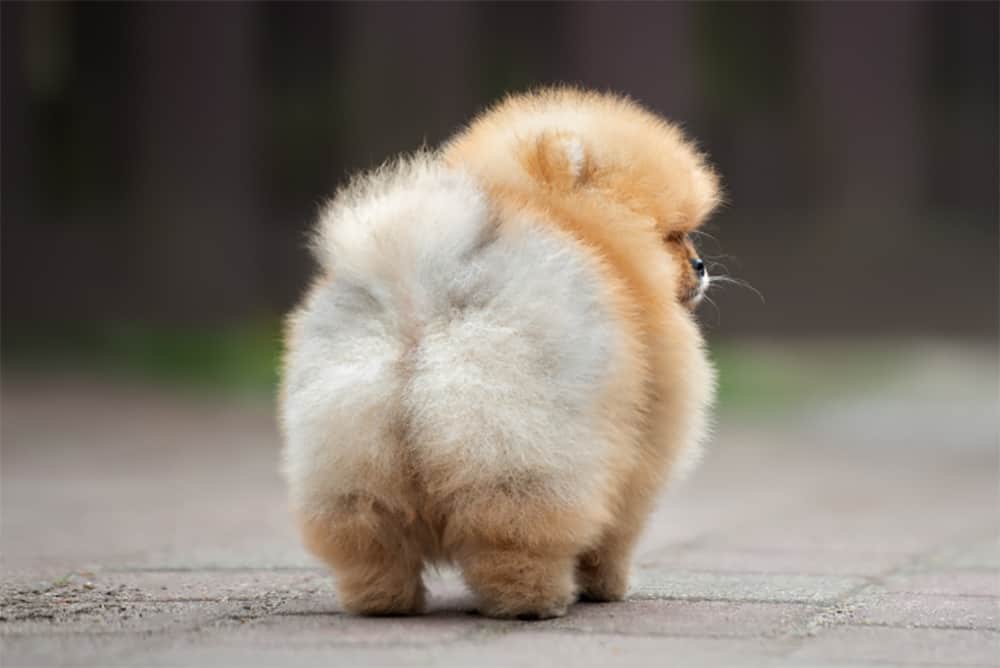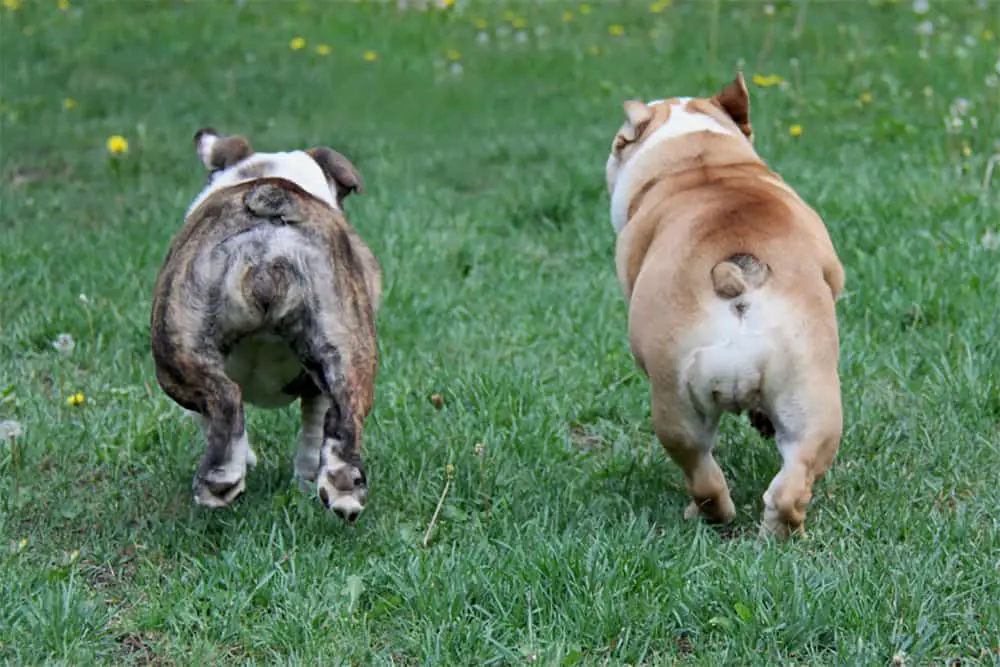Dogs make great companions. They are friendly, accepting, and will give you unconditional love as well as regular fun. However, there is no denying that dogs can be smelly. One of the worst smells is a fishy smell.
Don’t panic; this is normal for dogs and is just an indicator of an issue that needs to be addressed.
Dogs secrete an unpleasant odor from the glands in their butt and which is fishy. These are their anal sweat glands, and it is a sign they need to be drained.

It is normal and can be helped and prevented with a few changes. In this article, we can help you understand why your dog may smell fishy and what to do about it.
What Are Anal Glands In Dogs / What Do They Do?
Anal glands are located on the lower sides of the anus, and both male and female dogs have them. The glands contain a strong, fishy-smelling odor which is secreted to mark territory, as well as an identifying scent.
The scent assists other dogs in knowing the dog’s health and characteristics. These glands empty when a dog poops and should secrete every time. They can become blocked and cause issues.
Their main purpose is to produce a strong odor and unique smell to each dog and to mark their territory.
Have you ever noticed that dogs smell each other’s butts when they meet for the first time? This is due to their glands. It is your dog’s unique scent, similar to human fingerprints.
Is It Normal For My Dog’s Butt To Smell Fishy?
So, normal anal glands in dogs gradually secrete when dogs have a bowel movement, but they can become blocked.
When they are blocked up, the body is naturally trying to produce more of the liquid, meaning some of the liquid leaks involuntarily from the glands. It leaks, but it is still blocked up. It is normal for this liquid to smell fishy.
It has been described to smell like rotting fish and poop. The liquid can be thin and yellow but also thicker and gray.
It is a horrid smell, and you may be quick to assume it is not normal. It is normal, and it is most easily treated.
Other Reasons Your Dog’s Butt May Smell Fishy
It is most likely that this fishy odor will be from blocked anal glands, but it is true there could be some other reasons your dog’s butt may smell fishy. If your dog smells like fish and it is not due to the anal glands, it may be a sign of bigger medical issues that will need tending to.
This may be due to gastrointestinal issues, an infection, or dental issues. However, it is most likely that this smell will be from blocked anal glands.
Why Do Dogs’ Anal Glands Smell, And Why Do They Need To Be Drained?
Anal glands are not situated in a place that will smell good, and they need to be drained due to them not draining themselves correctly. The liquid does naturally smell and is a unique smell to each dog, allowing them to mark their territory.
They need to be drained if they become blocked up, and it may cause serious problems for your dog, such as an infection or anal abscess.
Why Do They Get Blocked And Fill Up?
Anal glands may become blocked and fill up for various reasons, some of which can be other medical reasons.
However, the most common reason dogs’ anal glands become blocked is due to a lack of pressure to empty the glands when pooping. The anal sacs/glands may become blocked because of inflammation within the ducts.
This can happen for many different reasons, and it is normal. Whilst the ducts are inflamed, the liquid is thick, and it will become painful for your dog to poop, and they will not be able to naturally secrete the liquid.
Anal sac disease can be a reason, too. This is a common disease in dogs and is not a serious disease, but it means that dogs’ anal glands/sacs become frequently blocked and need draining more than usual.
Why Does It Smell Fishy?
It smells fishy because it is a distinctive smell. Not all glands smell the same, as they are unique to each dog.

They all smell bad, though! It tells other dogs how healthy this dog is and how they are feeling. It sounds weird but is it how dogs communicate with each other.
Are Certain Breeds Of Dogs More Affected By Blocked Anal Glands?
All breeds of dogs can be susceptible to blocked or infected anal glands. However, there are some breeds that may be more likely to suffer from blocked anal glands from time to time.
Some of these breeds include all types of spaniels, chihuahuas, miniature poodles, beagles, Bassett hounds, toy poodles, and Lhasa apsos breeds. These breeds may be more likely to have frequent issues with their anal glands, but it is easy enough to treat.
What Are Other Symptoms Of Blocked Anal Glands?
Apart from the fishy smell, blocked annal glands come with other symptoms too. One of the most common symptoms is rubbing their butt across the floor. This is usually because they want to relieve the annoyance or itch their glands.
They may also lick or bite their butt, leaving them with horrible breath too. This will be them trying to alert you that they are uncomfortable in some way. Dogs may also chase their tail and turn around frequently to look at their butt, as well as sit uncomfortably.
Can I Express My Dog’s Anal Glands Myself?
You can absolutely express/squeeze your dog’s anal glands yourself. It is best advised to let a vet or medical professional do it as they do know what they are doing. It is important to be sure that the glands need draining.
Otherwise, this may hurt your dog and inflame the glands. However, if you do think it is best to do it yourself at home, it is important to know what you are doing. Firstly, you need to have clean hands and gloves on.
Make sure you have some kind of gentle lubricant for your dog. It is not the nicest task, but do bear with the process! Next, you will need help to keep your dog still, whether this is your partner or a friend.
Make sure to restrain your dog gently. Stand behind your dog and insert your index finger in the anus, and keep your thumb on the outside. Then, bring your thumb and finger together and run them inside the left side, feeling for a small circular gland.
They may be firm, and they may be softer. If it is soft, it means they are not as full. When you have found the glands, gently squeeze them with your finger and thumb. This will gently drain some of the fluid from the glands.
The liquid will come from just next to the anus, so make sure you know this. If the fluid is thin, it is normal. If the liquid is chunky and green, it is abnormal and should be checked out.
How Do I Know If My Dog’s Anal Glands Need To Be Drained?
It is relatively easy to know whether your dog needs its anal glands drained. They will be scooting along the carpet and paying a lot of attention to their butt.
They will try to let you know that there is an issue, and they may lick their anus a lot. Additionally, if your dog’s glands need draining, they will smell very strong and unpleasant, like rotten fish!
Are There Any Products Or Medications That Could Help?
To help the issue of blocked anal glands, you may be able to improve your dog’s diet, health and give them special supplements.
There are no products that you put directly near the anal glands as it is mostly a coincidence or bodily issue rather than a direct issue; one of the best solutions is to factor more fiber into your dog’s diet, such as vegetables and types of organic food.
It has been said that probiotics and prebiotics may help with your dog’s bowel movements and firm their poop. Fermented foods like kefir, fermented vegetables, and organic supplements may help with firmer stools.
Make sure your dog is getting regular exercise, as well as a healthy diet. A raw diet may be a good option, as dry food diets may cause softer stools that do not allow the glands to empty properly.
High fiber raw diets, including vegetables, meat, and raw eggs, will help the digestive process. So, they are not products destined for the cure of blocked anal glands, but there are things you can do to prevent it and help their health.
Is It Preventable?
Blocked anal glands are not something that can particularly be directly prevented. Not to worry though, it has been said that increasing fiber could reduce the frequency of anal gland blockages.

Blocked anal glands are prevalent in overweight dogs, so it is definitely something that you can pay attention to.
Make sure your dog is on the best diet for their health and that they are relatively slim. If they suffer from blocked anal glands too regularly, it may be worth taking them to the vets for regular checks on this matter.
What Are The Symptoms Of Anal Gland Infections Or Abscesses?
The smell maybe because of an infection or abscess in the anal gland. These infections can cause issues, so it is best to solve this sooner rather than later. Infections may lead to an abscess.
An abscess is a collection of pus and white liquid that will form in the glands, and it is very painful.
How Much Does It Cost To Have My Dog’s Anal Glands Squeezed By A Vet?
The vet may be your best option for emptying your dog’s anal glands, especially if you have never done it before. It can cost somewhere around $30 for the draining of your dog’s anal glands.
It should not be massively expensive, and the prices may differ depending on your vet and what is needed for your dog. For example, if your dog is suffering from an anal abscess, it may need more extensive treatment than simple anal gland drainage.
Final Thoughts
It can be really unpleasant to be eating dinner or going about your day and smell a fishy, strong odor coming from your dog. The smell is rather strong and may panic you, it is likely that your dog just needs their anal glands draining, and they are blocked.
It is very normal, treatable, and preventable. You may be able to help your dog by giving them a healthier lifestyle, making sure they are adequately exercised as well as not being overweight. So, if you are wondering why your dog’s butt smells like fish, do not worry too much.
Make sure to research and get a veterinarian to drain and check your dog’s anal glands unless it is completely necessary not to.




